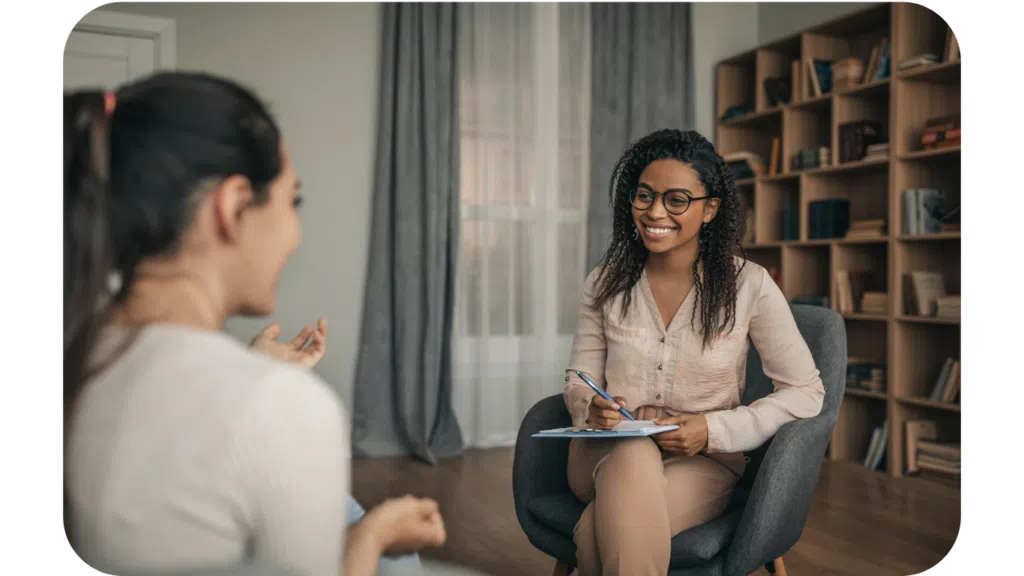Finding a Black Female Therapist in New York

If you’re a Black woman looking for mental health support, you may have wondered how to find someone who truly “gets it.” The journey to emotional well-being is deeply personal, and having a therapist who shares your cultural background or understands your lived experiences can make a world of difference. In a city as diverse and bustling as New York, finding a Black female therapist in New York who can offer both professionalism and genuine warmth is possible. This guide will help you navigate the process of finding therapists who understand your needs, so you can feel supported, empowered, and truly heard.
Why Representation Matters in Therapy
Representation in therapy isn’t just a buzzword, it can significantly impact the comfort and trust you feel in counseling. For many Black women, working with a Black female therapist provides a sense of relief and understanding. You won’t have to constantly explain cultural references, family dynamics, or experiences with racism and microaggressions, because your therapist likely already understands these contexts. Studies even suggest that clients matched with therapists of the same ethnicity often feel more satisfied and stick with therapy longer. When you see someone who looks like you and resonates with your experiences, it reduces feelings of isolation. It sends a powerful message: “You are not alone, and your feelings are valid.”
Moreover, having a therapist who shares your cultural background can foster deeper empathy and trust. For example, Black individuals dealing with racial stress or discrimination may get more empathetic and relevant support from a therapist who has faced or comprehends similar challenges. This kind of understanding helps build a safe space where you can be your authentic self. Ultimately, representation in therapy matters because it creates a foundation of trust, which is essential for healing and growth.
Cultural Competency You Can Trust
Even if you don’t find a therapist who matches your identity exactly, it’s crucial that they are culturally competent. Cultural competency means the therapist is trained and committed to respecting and understanding your culture. You deserve a professional who acknowledges how race, gender, and culture intertwine with mental health. A culturally competent therapist will actively listen to your experiences, from dealing with workplace bias to family expectations, without dismissing or minimizing them.
At our practice, we prioritize cultural competency you can trust. This means our team of therapists (including several Black female therapists in New York) has the expertise to address mental health through a culturally sensitive lens. They continually educate themselves on the unique experiences of Black women, ensuring you won’t have to teach your therapist about what it means to be a Black woman in today’s society. Instead, you can focus on healing, knowing that your therapist is equipped to understand nuances like hair discrimination, code-switching, or the impact of community and faith in your life. With culturally competent care, you can feel confident that your perspective will be valued and your therapist will honor your identity.
Specialized Support for Black Women in NYC
New York City life can be exciting and challenging all at once. As a Black woman in NYC, you might be juggling a fast-paced career, family responsibilities, and the ever-present news cycle, all while navigating the unique stressors that come with racial and gender dynamics. Specialized support means having a therapist who not only understands mental health, but also the specific context of Black womanhood in New York.
Black female therapists in New York often have experience addressing issues like racial trauma, workplace discrimination, relationship dynamics, and the pressure of the “strong Black woman” stereotype. They recognize the double burden of racism and sexism that Black women may experience (sometimes called misogynoir) and how that impacts your well-being. In therapy, this specialized support can translate to coping strategies tailored to your experiences, whether it’s dealing with microaggressions on the subway or finding solace in community and cultural practices. With a therapist who specializes in supporting Black women, you gain affirmation and tools that resonate with your reality, helping you thrive in the city you call home.
What to Expect in Your First Session
Taking the step to start therapy is courageous, and it’s natural to feel a bit nervous about your first session. Knowing what to expect can ease some of that anxiety. In your initial meeting with a Black female therapist (or any culturally sensitive therapist), you can anticipate a warm, welcoming environment. Here’s what usually happens in a first session:
- Introductions and Rapport Building: Your therapist will introduce themselves and invite you to share what brings you to therapy. This is a no-pressure conversation, you can share as much or as little as you feel comfortable.
- Discussing Your Background: To better support you, the therapist may ask about your background, including work, family, and any cultural or identity factors important to you. This helps them understand the context of your experiences.
- Setting Goals Together: You’ll talk about what you hope to achieve in therapy. Whether it’s managing anxiety, healing from trauma, or simply having a safe space to vent, your therapist will help you clarify your goals.
- Explaining Confidentiality and Process: A good therapist will explain that your sessions are confidential and review how therapy works. They’ll encourage you to ask questions about the therapy process or their approach.
Remember, the first session is also your chance to assess the fit. It’s okay if you don’t click with the first therapist you meet. Therapists understand that finding the right match is important, and they won’t be offended if you decide to try someone else. By the end of your first session, you should feel heard and understood; if not, it’s perfectly okay to explore other options. The goal is for you to feel comfortable and supported from day one.
How Our Approach Centers Your Needs
Our approach to therapy is all about centering your needs and empowering you as the expert of your own life. We understand that Black women often wear many hats, caretaker, professional, friend, partner, and it’s easy to put your own needs last. In therapy, you are the priority. Here’s how our therapists ensure the care you receive is tailored to you:
- Personalized Treatment Plans: We don’t believe in one-size-fits-all solutions. Your therapist will collaborate with you to develop a plan that aligns with your unique goals, values, and comfort level. For instance, if faith or cultural traditions play a part in your healing, your therapist can integrate that. They will also adapt to your preferred style, whether you want structured techniques or a more open-ended conversation.
- Empowerment and Strength-Focus: Our therapists recognize the resilience of Black women, and while we help you work through pain or stress, we also highlight your strengths. The aim is not to “fix” you (because you are not broken) but to empower you with tools and insights that make life’s challenges more manageable.
- Ongoing Feedback and Collaboration: Our therapists regularly check in on how you feel therapy is going, because your feedback is crucial. If something isn’t clicking, we adjust, maybe by trying different techniques or changing pace. Your therapy journey is a partnership, and your voice guides the process.
- Safe and Non-Judgmental Space: Creating a safe, non-judgmental space is non-negotiable, you can talk about anything, from racism you encountered at work to a painful family memory or even ambivalent feelings about being in therapy, without fear of judgment. Your therapist will validate your experiences and emotions and help you process them constructively.
By centering your needs, our approach ensures that you always feel seen, heard, and supported. Therapy is your time to focus on you, and we are here to facilitate that in the most affirming way possible.
Overcoming Stigmas About Mental Health Care
It’s unfortunately common for Black women to face stigma when seeking mental health care. You might have heard messages like “Black women have to be strong” or felt pressure to handle problems on your own. In some communities, going to therapy might even be whispered about or seen as a sign of weakness. In reality, seeking help is a sign of strength and self-awareness. Mental health is just as important as physical health, and you deserve care in both areas.
If you’ve been worried about what others might think, know that you’re not alone in those feelings. Historically, African Americans have been less likely to seek therapy compared to White Americans.
This gap isn’t because Black women don’t experience stress or mental health challenges; it often comes down to stigma and a lack of trust in providers who may not understand our culture.
The good news is that this is changing. More Black women are proudly talking about therapy, and the narrative is shifting from silence to empowerment. Overcoming stigma starts with recognizing that your feelings matter and that getting help is not “weak.” It takes courage to confront your emotions and work on your well-being.
Culturally competent Black therapists understand these stigmas and approach therapy with extra sensitivity. They know how to build trust with clients who might initially feel hesitant. Everything you share in therapy is confidential, and you have control over your story. With each session, you’re taking steps to break generational curses of silence and prioritize your mental wellness. Remember: accepting help when you need it is a form of self-care and empowerment.
Your Journey to Healing Starts Here
At this point, you may feel a mix of hope and uncertainty. That’s completely normal. Healing isn’t a straight line; it’s a path with twists, turns, and occasionally some obstacles. But with a therapist who offers support, empowerment, and understanding, you’ll have a guiding light even on the tough days.
Our providers are here to remind you that you don’t have to carry every burden alone. Whether you’re dealing with anxiety, depression, trauma, or just the stress of daily life, therapy can be the space where you reclaim your voice and find healthy ways to cope.
If you’re ready to take the next step, we’re here to help you. Your journey to healing starts here, and you don’t have to walk it alone. It can begin with a simple first appointment or even just browsing our directory of supportive professionals. Every big change starts with a first step. This could be yours.
When to Contact a Qualified Therapist
You might be wondering if it’s the “right” time to reach out to a therapist, or what kind of issues warrant professional help. The truth is, therapy is for anyone who feels they could benefit from some extra support or a non-judgmental listening ear. Here are some signs and situations of when you might consider contacting a qualified therapist:
- Persistent Stress or Sadness: If everyday life feels overwhelming or you’re stuck in a cloud of sadness or worry that won’t lift, a therapist can help you find balance and healthy coping techniques.
- Experiencing Trauma or Grief: Losing a loved one, going through abuse, or experiencing racial trauma (like harassment or discrimination) can leave deep emotional scars. You don’t have to process these heavy experiences alone, a therapist who is culturally aware can provide a safe space to heal.
- Big Life Transitions: Major changes such as starting a new job, moving to NYC, ending a relationship, or becoming a parent can be both exciting and stressful. Therapy can help you navigate these transitions and the complicated feelings that come with them.
- Feeling “Not Like Yourself”: Maybe you’re usually the cheerful, go-getter friend, but lately you’ve felt disconnected or numb. Any time you feel unlike your usual self and it concerns you, it’s worth reaching out. There’s no problem too “small” for therapy, if it’s affecting your quality of life, it matters.
Remember, you don’t need to wait for a crisis to seek help. Early support can prevent bigger challenges down the road. If you’re even considering therapy, that’s a sign that it might be helpful for you.
Your Next Step: When you’re ready, consider browsing our provider directory at Thriving Center of Psych. We have several Black female therapists in New York who are passionate about supporting and guiding Black women through life’s challenges. Reading through the profiles can help you find someone who feels like the right fit. You deserve a therapist who is not only qualified, but also genuinely cares about understanding you.
Finding a therapist is a personal decision, and it can feel daunting but you’ve already taken a huge step by seeking information. By focusing on representation, cultural competency, and your own comfort, you are setting the stage for a positive therapy experience. Whether you connect with a therapist through our directory or elsewhere, remember that you are worthy of compassion and understanding. Your mental health matters, and with the right support, you can truly thrive.

Finding a Black Female Therapist in New York
If you’re a Black woman looking for mental health support, you may have wondered how to find someone who truly “gets it.” The journey to emotional well-being is deeply personal, and having a therapist who shares your cultural background or understands your lived experiences can make a world of difference.

Finding a Bilingual Therapist in New York City
a city where people speak over 200 different languages, finding a bilingual therapist in New York is more than a convenience – it can be a game-changer for mental health

The Link Between Social Media and Depression
In today’s world, scrolling through social media is as routine as brushing our teeth. We open apps out of habit — on the train, in bed, while waiting in line. Platforms like Instagram, TikTok, and Facebook keep us connected, informed, and entertained.

Signs Depression is Taking a Toll on Your Relationship
Depression can impact every part of a person’s life, from their work to their romantic relationships. Dealing with depression can take its toll on both the person with depression and the supporting partner. If you’re worried that depression is affecting your relationship, understanding its impact is an important first step.

